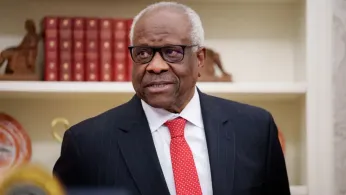
3 hours ago
Justice Clarence Thomas Questions Marriage Equality Precedent
READ TIME: 4 MIN.
In a public statement reported on September 29, 2025, U.S. Supreme Court Associate Justice Clarence Thomas expressed skepticism toward the binding nature of Supreme Court precedents, including the landmark 2015 marriage equality ruling in Obergefell v. Hodges. Thomas asserted that he would not adhere to precedent "if I find it doesn’t make any sense," describing previous rulings as "not the gospel" and emphasizing their potential for reversal. These comments have triggered renewed anxieties among LGBTQ+ communities and legal experts, who see them as signaling an openness to reexamining and potentially overturning existing rights.
The Supreme Court’s Obergefell v. Hodges decision in 2015 affirmed that marriage is a fundamental right guaranteed to same-sex couples by the U.S. Constitution, requiring states to license and recognize such unions. The majority opinion, authored by Justice Anthony Kennedy, highlighted the importance of equal dignity and liberty for LGBTQ+ Americans, stating, “Their hope is not to be condemned to live in loneliness, excluded from one of civilization’s oldest institutions. They ask for equal dignity in the eyes of the law. The Constitution grants them that right”.
However, dissenting justices—among them Roberts, Alito, and Thomas—argued that the Constitution does not explicitly provide for same-sex marriage and that the decision represented judicial activism rather than constitutional interpretation.
Justice Thomas has a long record of questioning the doctrine of stare decisis, the principle that courts should follow precedent. In his concurring opinion in the 2022 Dobbs v. Jackson Women’s Health Organization decision, which overturned Roe v. Wade, Thomas called for the Supreme Court to reconsider all of its substantive due process precedents—explicitly naming decisions related to contraception and same-sex marriage as candidates for review. He wrote, “Because any substantive due process decision is ‘demonstrably erroneous,’ we have a duty to ‘correct the error’ established in those precedents”.
Thomas’s approach has consistently emphasized judicial restraint and a rejection of what he views as judicial policymaking. Nevertheless, critics argue that his willingness to revisit settled precedent threatens the stability of rights that millions of Americans rely on, including marriage equality and reproductive freedom.
Thomas’s remarks have heightened concerns among LGBTQ+ advocates that the Court’s conservative majority may be willing to entertain challenges to marriage equality in the future. This apprehension is compounded by recent petitions formally asking the Supreme Court to overturn Obergefell, though legal experts note that the 2022 Respect for Marriage Act requires federal and state recognition of legal same-sex marriages even if the Supreme Court were to reverse its previous ruling.
According to a 2024 Gallup poll cited by ABC News, support for marriage equality remains strong at around 60% but has softened slightly in recent years, reflecting a shifting legal and political landscape for LGBTQ+ rights. The Williams Institute at UCLA Law School estimates there are more than 823,000 married same-sex couples in the United States, with nearly one in five parenting a child under 18.
LGBTQ+ organizations have responded to Thomas’s comments with calls for vigilance and renewed advocacy. Rocio Fierro-Pérez, political coordinator for the Texas Freedom Network, stated, “The Supreme Court’s decision has brought us into a new era where they are taking away rights instead of giving them. Abortion access is one of several fundamental rights that’s under attack including our right to vote, racial justice, LGBTQ rights, and they’re all intertwined with our right to liberty in which Roe v. Wade was grounded”.
Despite the uncertainty, federal protections for marriage equality remain in place. The Respect for Marriage Act, signed into law in December 2022, requires all states to recognize legal same-sex and interracial marriages performed in other jurisdictions, even if there is a future change in the law. Legal scholars highlight this act as a crucial safeguard for LGBTQ+ couples, though it does not prevent future legal battles over the recognition and scope of marriage rights.
Advocates continue to stress the importance of public awareness and participation in the democratic process to protect hard-won rights. National LGBTQ+ organizations, such as the Human Rights Campaign (HRC), have urged Congress to further codify protections for LGBTQ+ people and to resist efforts that would undermine equality under the law. The ongoing debates underscore the interconnectedness of LGBTQ+ rights, reproductive justice, and broader civil freedoms.
Thomas’s statements must be understood within a larger movement among conservative jurists and activists to challenge the scope of substantive due process and civil rights protections. Since the Supreme Court’s ideological shift in recent years—now comprising a six-justice conservative majority—there has been increased speculation about the future of landmark cases, including Obergefell v. Hodges and Lawrence v. Texas.
While no case directly challenging Obergefell is currently scheduled for argument, observers note that the Court’s willingness to revisit precedent could embolden legal challenges from opponents of marriage equality.
For many LGBTQ+ individuals and families, the possibility of losing marriage rights is a deeply personal and urgent concern. The uncertainty created by Thomas’s remarks and ongoing legal challenges has prompted renewed activism and solidarity within the community. Organizations such as Equality Ohio and national advocacy groups continue to provide resources, legal assistance, and public education to support couples and families at risk.
Community leaders emphasize the need for intersectional advocacy, recognizing that threats to LGBTQ+ rights are often connected to broader struggles for racial, reproductive, and economic justice. The message from advocates is clear: vigilance, solidarity, and democratic engagement are essential to defending and advancing equality.
Justice Clarence Thomas’s comments have reignited debate over the future of marriage equality and the durability of Supreme Court precedents. While federal law continues to protect same-sex marriages, the shifting judicial and political landscape has made clear that these rights cannot be taken for granted. For LGBTQ+ Americans and their allies, the challenge ahead lies in protecting existing freedoms, resisting regressive legal efforts, and ensuring that the promise of equal dignity continues for future generations.






